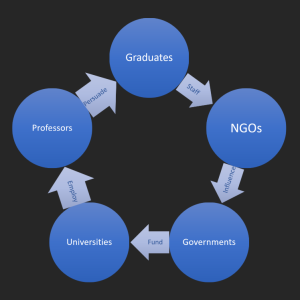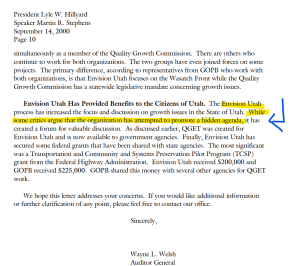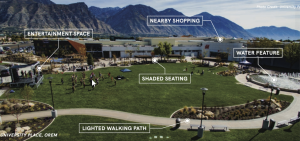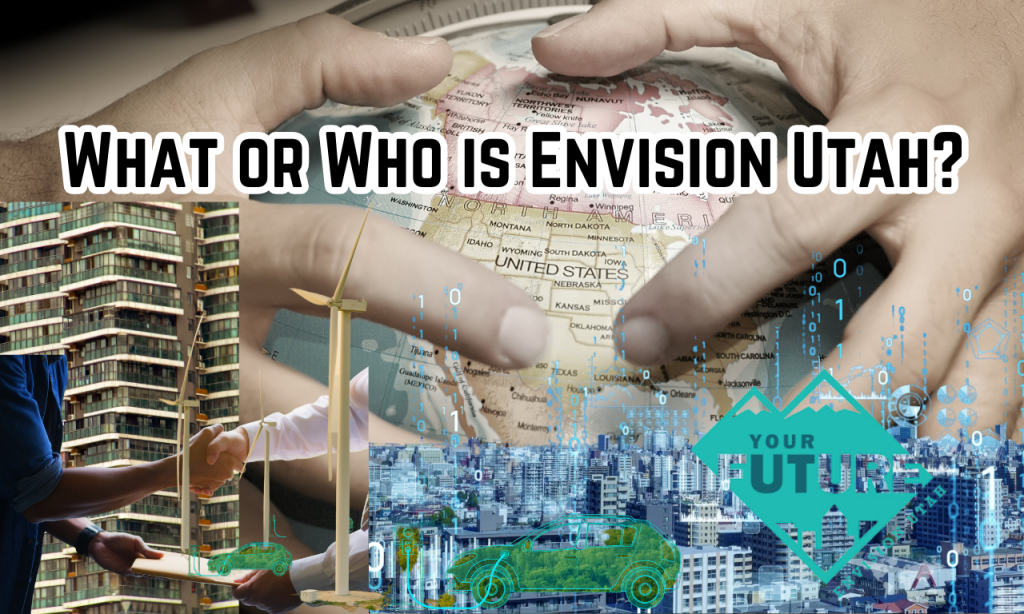Author- Jim Jensen
There is an anti-democratic danger growing worldwide that threatens to put our public policymakers beyond accountability. It goes by the designation of “non-governmental organizations.” They are generally referred to as “NGOs” and are setup up separately from local, state, or international governments. Typically, NGOs can receive funding from governments at any level. One influential non-governmental organization in Utah is called Envision Utah.
NGOs are set up and/or contracted by governments to do their thinking and planning because our elected leaders and their perennially expanding staff are too busy governing to be bothered with minutiae. This is a way that politicians can outsource their responsibility and maintain a degree of plausible deniability for unpopular policy.
One big problem with NGOs is their leaders are not elected by the public, and they can have a big impact on public policy. While NGOs like to represent themselves as non-partisan, the truth is everyone has a political persuasion. And unfortunately, the people we find at the head of many NGOs are like Ari Bruening, the CEO of Envision Utah (EU), who earned his JD from Harvard Law School. It’s not hard to guess which direction his politics lean.
The trouble with this is that NGO leadership remains in place beyond local administration changes. The history of our democracy (prior to 2000 for some odd reason) shows that the outcomes of many elections are the result of a backlash against wrong-headed policies put in place by elected leaders. What we typically don’t see is that the elected leaders are taking their cues from the NGOs who remain in place after the figureheads are swept aside. The NGOs can then start right in with their persuasion of the new administration.
If an organization like Envision Utah is promoting policies that the public shows their disapproval of in an election, there is no mechanism in place to curb their influence on the new wave of politicians. These organizations are left unchecked and unaccountable. They have the potential to grow into a cancer like the World Economic Forum (WEF). Because the WEF has been unaccountable to any customer base, electorate, or government for 50 years it has grown into a powerful leviathan with over $330M in annual revenue and almost a billion dollars in assets. At this scale, an NGO can influence not just local, but global policy at the United Nations level.
The intellectual types that lead these organizations are typically highly educated (aka indoctrinated) by academia. This positions them in the circle of the elite. Anyone in their ranks who dares to cross swords with them will likely be outcast and discredited. It must be difficult to have a law degree from Harvard and not believe you are smarter (no one is allowed to argue against you) and know better than everyone else.
In the world of higher education, student opinions are cast in the mold of their professors. Professor’s opinions are created in the image of their funding sources. Those funding the universities are typically governments or big business, i.e., people with a passion for controlling the masses. Big businesses and governments are taking their cues from the NGOs. It’s a giant, incestuous cesspool of elite thinking.

In a sane world, NGOs could be helpful because government has proven itself incompetent at every level. There is little doubt the people drawn to these organizations start out wanting to do good. However, in a world of fake neutrality, the only way to advance is by consistently failing to notice the emperor is wearing no clothes. People with different opinions that are “unapproved” have no future at an NGO. As anyone who has been through college knows, the best way to excel is not by searching for the truth, but by subscribing to your professor’s opinion.
To get an idea of how what starts out as a good intention can devolve into another mechanism for controlling everything, let’s take a closer look at Envision Utah.
Founded and funded in 1997 (oddly we found a few different dates for this- but this is the most consistent) by successful Utahn’s with ties to the governor’s office, Envision Utah struggled to make an impact initially, in part due to fears about hidden agendas that have been around since their beginning. By 2020, their revenue was under $1.5 million. Not exactly stellar growth.
Envision Utah, QGET, SmartUtah, WGU were audited in 2000. The findings were quite fascinating. Below will go into a bit of it, but before that please make note that back in 2000 some thought Envision Utah may be pushing a hidden agenda.

Most of EU’s revenue is from private donations. Another big chunk is from government grants. Over half of the revenue is expended on the salaries of the 3 paid officers: Bruening, the President, Jason Brown, the Secretary, and Ryan Beck the VP of Planning. There are over 135 other unpaid “board members” and “chairs” listed on IRS Form 990. Over $1.2 million was claimed as assets in 2020.
What this means is that bulk of the heavy lifting for Utah’s future is being coordinated by just 3 full-time people. Does this elite group have the final say on the interpretation of primary research data and recommendations to government for growth policies? This is a very small, powerful, and independent group of people making a big noise with their glossy web site and flawless PDFs. What is clear from perusing the content on envisionutah.org is that there is a lot of technical and design talent contributing to their publications.
Apparently, there weren’t enough current problems for Envision Utah to focus on so they took as their core mission to plan for “future” problems that Utah may face as part of its rapid growth. In 2015, they executed on a commissioned research project to measure Utahn’s concerns about issues. Through an in-depth online survey at envisionutah.net, they reached over 50,000 residents to query them about 11 different issues ranging from energy and education to disaster recovery and city planning.
In the survey (which is still open), participants are asked to select their preferred outcome from 5 proposed scenarios for each of the 11 issues. Each fictional outcome is based on a set of assumptions about estimated tax revenues and costs, predicted human behaviors, and the feasibility of accomplishing the requirements for achieving the outcome. Participants are forced to make trade-offs when selecting their preferred outcome in a sort of zero-sum game that leaves little room for business innovation and discoveries that could invalidate the assumptions.
They openly skew the survey results by naming the proposed scenarios after native flora and fauna. The scenario they don’t want people to select is named after the allosaurus. Why would anyone make a choice that associates them with an ancient, extinct reptile? This is a not-so-subtle example of the elite looking down on and ridiculing wrong-think.
Another difficulty with this survey is that it pretends to have any idea what the world will look like in the year 2050. When the survey was launched, 2050 was still 35 years in the future. While that may not sound too distant, think about the changes we’ve witnessed since the 1980s. During the early part of that decade, college students were still using typewriters to prepare essays. Very few could have imagined the Internet, let alone daily video calls with team members across the globe or kitchen appliances with voice interface that can order a product and have it delivered within hours.
It is common trait among NGO types that they seem to be obsessed with micro-managing our future. We hear nothing from the World Economic Forum except them telling us how everything is going to be in the future. We will eat bugs, own nothing, and be happy.
Envision Utah seems to be following the same path. The name itself implies to “picture mentally, especially some future event or events.” And it’s not hard to detect the convergence of Envision Utah’s idea of our perfect future with what is spelled out by the WEF or United Nations.
What better guide to sample than their own 2021 Annual Report to get a sense of how Envision Utah views its mission and relationship to Utahns and the world?
In the introduction, they are still resting on the laurels of their 7-year-old survey which they claim has “guided state and local growth decisions.” They claim that their success stems from their “visioning process” which has resulted in “changes to public opinion.”
One can assume they would only be taking credit for this if they changed the public’s opinion to be more in line with what they think is right. This is part of the problem with organizations like this. They seek more to shape and change opinions than determine what people’s existing opinions are. They only need to change your opinion if it’s wrong.
We can be sure that they claim opinions are changed through “education,” but isn’t that just another way of saying we need you to see things our way because we are educated? It’s as if the opinions we have formed through our lifetime of experience do not qualify us to think clearly about important issues. That is unless we agree with them.
The elitist mindset is typically hidden behind the unimpeachable language of do-gooders. Who is against a cleaner environment and shorter commutes? But with practice, their sleight of hand can be easily detected. Envision Utah wants to get residents and decision-makers to “commit” to take the “right steps” to preserve what is loved about Utah. Implied is that the “right” steps are already known to Envision Utah, but the lowly residents and leaders must be made to commit to take them. If the steps are so right, why isn’t getting people to take them effortless?
Granted that Envision Utah has put more work into establishing a vision for Utah’s future than any other organization, it becomes concerning that they now see themselves as the owner and guardian of that vision. When a project like this gain’s momentum, it becomes more difficult to course correct. Years of gazing into the crystal ball become historical context for why their opinions are more correct than yours.
Listed as a top accomplishment for 2021, Envision Utah published seismic recommendations to address our most “urgent vulnerabilities” to a devastating earthquake. Nothing like the threat of disaster and death to prod the lazy masses into the corral of your advice. We learned that all too well with the pandemic response.
EU created a podcast last year and used it to “educate” listeners about “on-road mobile sources” of air pollution. For the uneducated, an on-road mobile source of pollution is a vehicle. This is an example of a jargon barrier set up to keep a distinction between the educated and ignorant.
Another program EU focused on in 2021 was the Blueprint Jordan River to enhance the “hydrological function” of the river and its role as a corridor for “active transportation.” For the jargon-impaired, active transportation is walking or biking. This is known as “exercise” to the uneducated, or what you do when you don’t have transportation. Given that hydrology is the study of the movement, distribution, and management of water, it seems odd that it could be one of the functions of a river. But it sounds really sophisticated.
Envision Utah is pre-occupied with “walkable centers” and believes dozens of them should be built along the Wasatch Front. Walkable centers are supposed to provide “better fiscal sustainability, more clean, efficient travel options, enhanced public health, cultivation of local identity, and increased availability of housing options close to jobs.” When something sounds too good to be true, it usually is.

None of these benefits sound reasonable unless you’re thinking that a bunch of people are going to want to live and work at a strip mall. Then you could walk or ride a bike to work, but you’d have to live in a cubby above Best Buy and work at Zupas. This is not the vision we should have our future generations aspiring to.
What is it with the elite, future-planning types that they want to cram as many people as possible into the smallest space possible, force them onto public transportation, and hope they’ll be content with the work and food options nearby? They likely haven’t thought through how a young mother will get her kids to the grocery store or carry her family’s groceries home . . . in the winter.
Sweeping lower- and middle-income people into a smaller, crowded, homogeneous living space like dirt on the kitchen floor doesn’t take vision or ingenuity. It’s more like a way free up infrastructure for the people who will keep their Tesla’s and large-lot, single family homes. If you’re going to envision the future, use innovation and discovery.
We need more visionaries like Henry Ford. Here’s a man who took a plaything of the rich and made it available to the middle- and working classes. He freed Americans to move much farther than ever before possible. With the automobile produced on an assembly line, Ford opened new experiences and opportunities for as many as he could. He shocked the industrial world by creating the living wage. He shortened the work week and workday and ultimately paid people twice what they could earn elsewhere.
“With all the wealth of the world at hand,” Ford said “there are human beings who hunger, whole nations who suffer cold. The judgment for this condition, for misusing Nature’s gifts, is the judgment upon man’s failure, man’s unsteadiness. Leadership is the thing.” This flies in the face of the zero-sum trade-offs fabricated in the weak imaginations of the 400 experts who built the Your Utah Your Future survey.
Fear not though, Envision Utah has embarked on a “Inclusivity in Planning” project. They say their planning experience shows that some people don’t plan as well as white people. Guess which groups are bad planners? You got it: the poor, the chronically ill, “colored” people, LGBTQIA+ (apologies if that’s not the latest acronym), and “gender non-conforming” people.
It’s very difficult to take an organization seriously once they have fallen for (or are promoting) the woke ideologies that are dividing and demoralizing our world. But this is not a surprise coming from an organization that is headed by Utah’s elite and staffed by hundreds of “experts.”
NGOs can’t help themselves when it comes to promoting the latest jargon-filled propaganda because they can never tolerate the views of anyone who can see the emperor’s naked butt. Unfortunately, Envision Utah is no exception. EU should be particularly concerning to Utah residents now because they have their sights set on “early learning” and “education.”
We don’t want a team of educated experts anywhere near our education process. The mess we are in is the result of trusting our education system to the experts. While many of us are alarmed at the state of our education system and trying to figure out how to save our children from it, these organizations are planning to begin indoctrination at an earlier age.
It would do well for alert Utah residents to be aware of the agenda of Envision Utah and other NGOs. Knowing what they are doing is a first step. Contacting legislators and urging them to strip away funding from organizations that promote demoralizing, racist, woke propaganda is a good follow up. There may be little we can do to stop the wealthy from funding their own, but let’s not sit idly by while the prophets of wokeism try to do our thinking for us.

